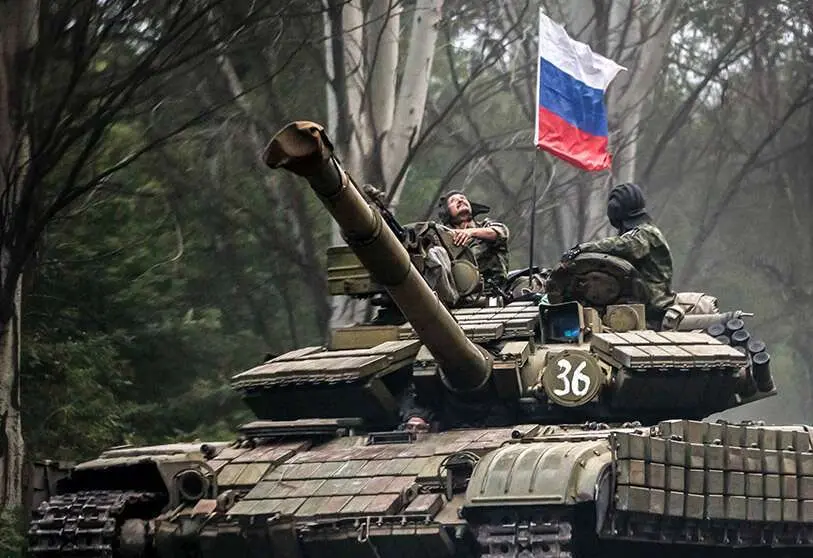Russia attacks eastern Ukraine and moves dangerously close to NATO's borders

Two weeks into the conflict between Russia and Ukraine, the number of open fronts for the Russian army continues to grow. On the sixteenth day of fighting, Ukrainian military authorities today reported new Kremlin shelling in the vicinity of two towns in the west of the country. They are increasingly close to the borders between Ukraine and the European Union, as well as North Atlantic Treaty Organisation (NATO) territories.
The attacks have been carried out in the western Ukrainian cities of Lusk and Ivano-Frankivsk, 87 kilometres from Poland and 150 kilometres from Romania respectively, as well as in the city of Dnipro on the Dnieper River. The latter would represent a decisive enclave for Moscow, as it would allow Putin to control the eastern half of the country.

In addition, a bombardment of Belarus from Ukrainian airspace on Friday afternoon could provide Minsk with a pretext for joining the Kremlin's offensive. However, according to Ukrainian border guards, the attack, described by Kiev as a "false flag attack", was carried out by Russian planes, which took off from a Belarusian airport, crossed the border into Ukraine, and from there fired on the small town of Kopani. All this coincided with Belarusian President Alexander Lukashenko's visit to Vladimir Putin in Moscow.
Even before denouncing the fake attack, Oleksiy Reznikov, Kiev's defence minister, warned his country and the international community of Vladimir Putin's intentions to launch a "provocation" that would motivate Minsk to enter the conflict. So far, however, Belarus has maintained that "the information spread about the attacks in Belarus is another provocation and an attempt to shake Belarusian society".

Meanwhile, news of Moscow's military reinforcements is coming from Russia's western borders, which - according to the Tass news agency - is a response to the "actions of NATO countries in this direction". President Putin defended this during a Security Council meeting. "The plan is about to be finalised, and will include an advanced missile system", as well as a "redeployment of combat units to protect the Western borders", warned Defence Minister Sergey Shoighu.
In addition, Vladimir Putin has announced the recruitment of Syrian soldiers to fight in the Russo-Ukrainian war. The Russian president has claimed that Moscow has more than 16,000 fighters from the Middle East - mostly from the allied regime of Bashar al-Assad - to which Volodymir Zelenski criticised that "they come to kill in a foreign country. To a foreign land.

However, the Ukrainian leader went on to encourage his fighters, declaring: "We are already moving towards our victory. This war is against an enemy that cares neither for its people, nor for its thousands of dead and dead soldiers. But we are already moving towards victory".
And as the attacks continue to spread, the numbers of wounded, killed and displaced, as estimated by the UN, are also growing by leaps and bounds: there are already more than 550 confirmed dead - at least 78 of whom are children - 950 wounded and more than 2.5 million displaced. "Russian troops have killed more civilians than Ukrainian soldiers," said Defence Minister Oleksii Reznikov.

In this scenario, Zelenski has made public the proposal of 12 new humanitarian corridors along with the delivery of food and medicine to the localities of Gostomel, Borodyanka, Andriivka, Mykulychi Makariv, Kozarovychi and Mariupol, among others. The latter, inhabited by almost 450,000 people, has been under siege by Kremlin shelling and artillery for more than a week and is, according to the International Red Cross, in an "apocalyptic" situation. Attempts to evacuate civilians from the city have failed repeatedly over the past six days.
And now, despite Moscow's assurances of evacuation routes for civilians out of Sumi, Kharkov, Kyiv and Mariupol, the Ukrainian authorities have, for the seventh time, denounced the failure of humanitarian attempts in the port city, as well as in Volnovakha.

Meanwhile, the European community met yesterday and today in Versailles, France, where important issues related to the EU's energy security, Ukraine's accession to the EU and increased defence spending were discussed. In this context, the High Representative for Foreign Affairs, Josep Borrell, proposed increasing the budget for the purchase of economic equipment to support Ukraine to 1 billion euros. This is just double the amount initially established, with the initial activation of the European Peace Support Fund (EPFSF).
And, along these lines, other countries have gone ahead with the imposition of sanctions, as is the case of the US, banning the import of Russian seafood, vodka and diamonds, or the EU in cooperation with the G7, which stated that it would seek cooperation with the World Trade Organisation (WTO) to restrict Western trade with Russia, as well as its access to funding from international organisations.








